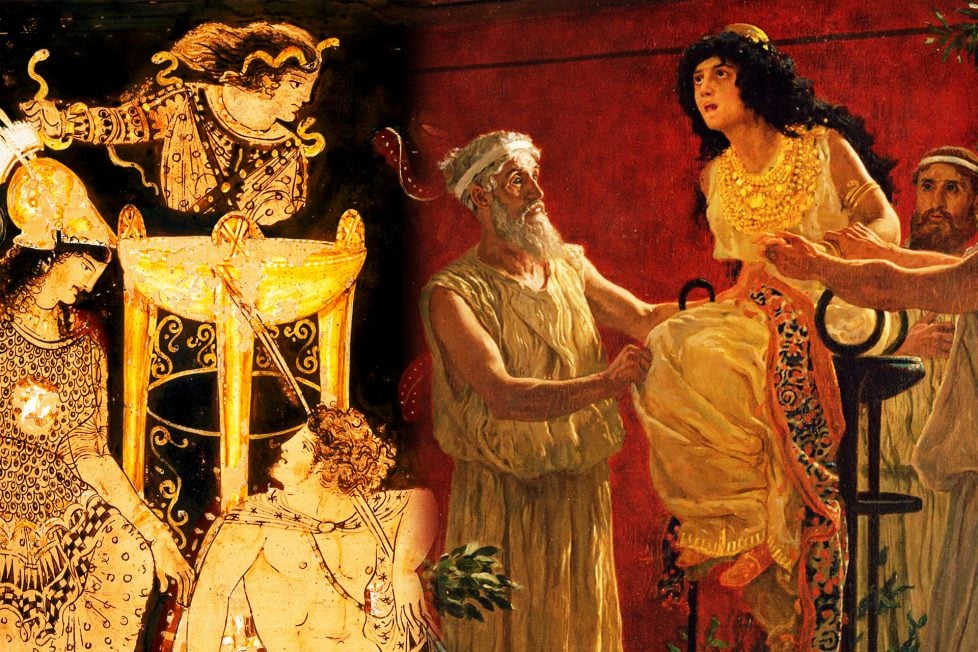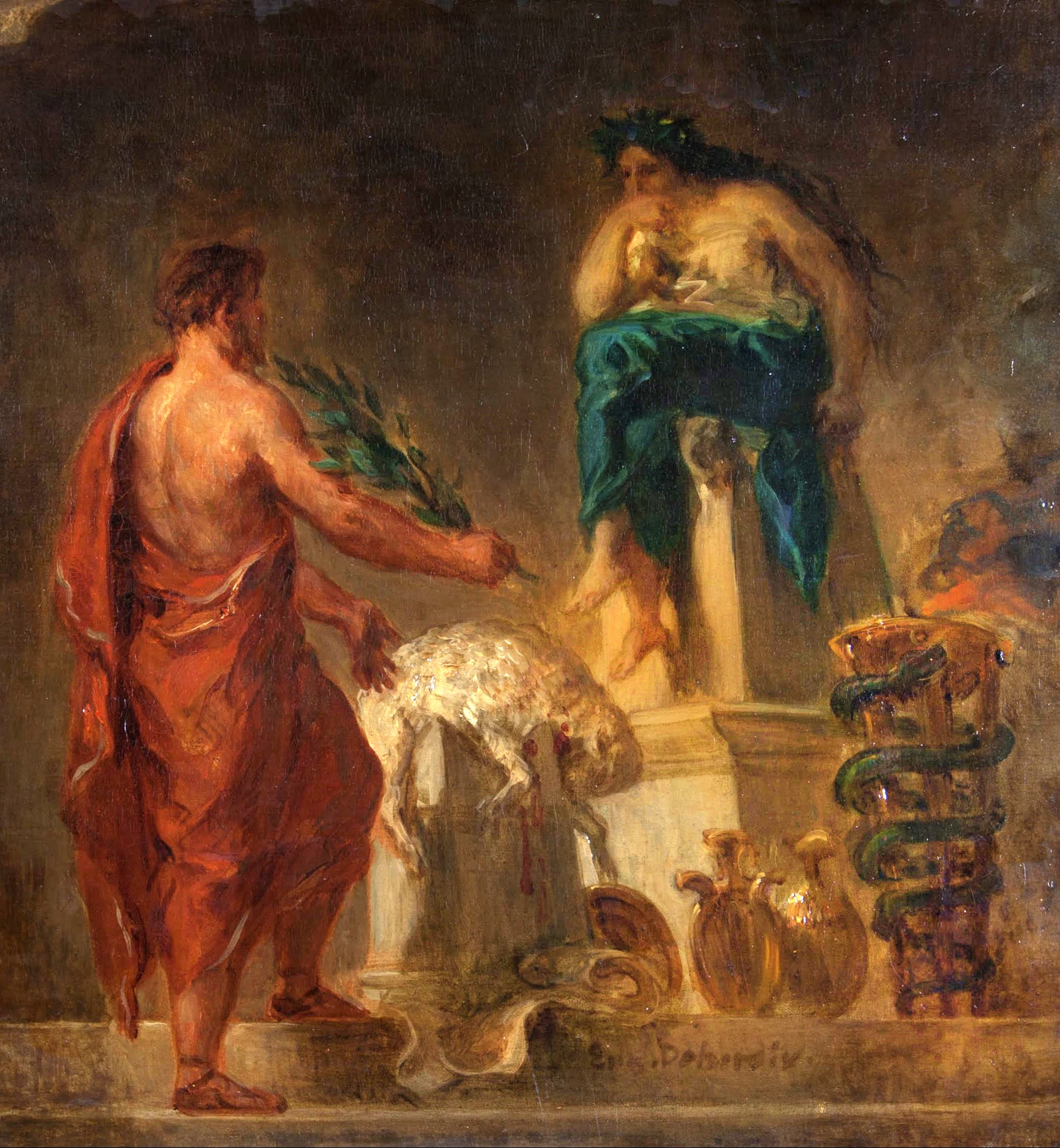The Oracle of Delphi: The Whisperer of the Hellas
Pythia, the oracle that shaped the fates of nations.

Pythia, the oracle that shaped the fates of nations.

Table of Contents
ToggleImagine an all seeing, all knowing fount of wisdom who is consulted by world leaders and has a hand in every major event of the time. Sounds far-fetched right? It may not surprise you that the Ancient Greeks among their philosophical advancements, their political engineering and spiritual predilections had such a prescient. This person at the heart of the Hellenic World was the Oracle of Delphi, aka Pythia, the mystic of the Hellas.
There are few major events in Greek history that the Delphic Oracle did not touch yet Delphi is still consigned to the Pagan history books as an interesting spiritualist story but nothing more. It is in fact quite the opposite. The Delphic Oracle shaped the political and spiritual realms of Ancient Greece and had given Ancient Greece’s enduring influence and importance stretching to modern society, which makes the Delphic Oracle and its history absolutely vital to understanding of our world.

‘Pythia’ was the name given to the priestess who sat atop the cauldron in the Temple of Apollo at Delphi. This was the physical embodiment of the oracle. Clad in a short white dress these priestesses would sit in rotation in the cauldron which itself sat on top of a tripod.
Originally the priestess were virgins and presented as such. However, according to Diodorus, Echecrates the Thessalian physically violated one of the priestesses. Thence forward the priestesses were late age women with no suggestion of virgin purity. The priestesses themselves were from no particular background; they were poor and aristocratic, intelligent and dim; there was no particular selection criteria other than an intangible spiritual feeling the surviving priestesses had when replacing a deceased priestess.
Before assuming their positions, the priestesses on the seventh of each month (except the three months of winter) would be led on purification rites. These rites included bathing in the sacred waters of the Castalian Spring and observing the proper sacrifice of a young male goat. The liver of the goat was checked for favourable health and therefore good omens; if the omens were good then the goat was burned outside the Temple. The smoke from this sacrifice signified to all around that the Oracle was open for business.

Petitioners to the Oracle would travel from all around the Greek world. To determine who visited the Oracle first, petitioners would draw lots. However, for a fee petitioners could promote themselves up the order. Similarly, Ambassadors from the City-States, on official business, were promoted up the running order.
Once inside the inner Temple, petitioners could make their request or question the Oracle. Pythia would listen to their petition and respond with prophecies. However, Pythia, or the priestess at that moment, would respond only in a trance like state and would only speak in unintelligible mutterings. These mutterings would be interpreted or translated by the two Priests of Apollo in the Sanctuary. There are good records of these priests because the historian Plutarch was one of these priests and left detailed descriptions.

The political significance of Pythia and Sanctuary at Delphi cannot be understated. From the first attestation of a petition to the Oracle in the eighth century BCE right down to the complete destruction of the Temple of Apollo in 390 CE by the Roman Emperor Theodosius I, the Delphic Oracle had a hand in nearly every major political event.
Back in the eighth century BCE the legendary Spartan lawgiver, Lycurgus, is reported to have visited the oracle, according to Herodotus. Lycurgus reportedly wanted approval for his new set of legal reforms which he received; the reform subsequently transformed Sparta into the powerhouse of the Aegean. This story may well be a post facto legend to beef up Lycurgus and Sparta’s credentials, but it does demonstrate the perceived power of the Oracle to approve or disapprove of events outside Delphi.

A similar story relates to the foundation of Cyrene in 630 BCE. The King of Thera was tasked by the Oracle with founding a new colony in Libya. However, it took three attempts for the King to get the message and do as the Oracle said; coincidentally during this time Thera suffered a significant drought! When Cyrene was eventually founded the city prospered for centuries and the rains returned to Thera.
Moreover, the Oracle was a key player in the Peloponnesian War. Thucydides gives a long account of Spartan envoys petitioning the Oracle. Sparta wished to know whether they should attack Athens in 431 BCE, a major political decision for the Hellas as a whole. The Oracle replied, according to Thucydides:
“It is said that the God replied if they fought with all their might, victory would be theirs, and that he himself would be on their side, whether they invoked him or not.”
The fact the Oracle took a position on a matter of war and geopolitics speaks to the wide remit of the Oracle away from spirituality and paganism. It is unimaginable this day in age for a world leader to consult the religious oracle on a matter of international policy or war at least with their credibility intact. This speaks to the importance of the Oracle as a supreme political influence and power.
For example, Philip II of Macedon asked the Oracle in 359 BCE if he could conquer the whole world. The Oracle responded that he who could master Philip’s horse, Bucephalus, would conquer the world and be victorious. Neither Philip nor his Generals could ride the horse. Philip’s son was the only one capable of doing so. Philip’s son was Alexander, later he became known as Alexander the Great and actually came close to conquering the world.
Pythia was an astute judge of both characters and politics.
The independence and power the Delphic Oracle enjoyed under Hellenic hegemony eventually came to an end.
First the Celts attacked in 279 BCE but were temporarily repelled. After 191 BCE the rise of Rome in the Aegean led to Delphi becoming supportive of the Roman cause, reducing its influence. However, the spiritual and symbolic importance of Delphi and the Temple of Apollo endured. Hadrian before he became emperor in 117 CE drank from the Castalian spring and was proclaimed as the next emperor. Upon becoming emperor, Hadrian had the spring covered up so no other person could benefit from its significance, demonstrating the enduring symbolic authority of Delphi.
This enduring authority turned out to be a double edged sword and eventually spelled the end for the Oracle. The authority of the Oracle as a pagan pilgrimage point butted up against the rise of Christianity within the Roman Empire. Christianity was busy trying to stamp its authority over the empire and in doing so was systematically rooting out paganism including monuments, inscriptions and cults. It is hardly surprising that the most famous pagan site was soon under threat.
This Christian destruction by the time of Theodosius I in 390 CE was in part inspired by the words of the Oracle itself. In 302 CE Diocletian was told by the Oracle that the Empire would be destroyed by Christianity which prompted his vicious persecution of Christians. Therefore, when Constantine the Great came to power and Christians rose once again, Delphi, the mystic who instigated the Great Persecution was the natural target of Christian pain and fury. This marked the end for the Delphic Oracle.

Studies of the Delphic Oracle have stretched over centuries but consensus has not been reached. Theories about the nature and cause of the Oracle’s hallucinogenic state have been posited and solutions have been favoured but the mystery still remains.
One solution is vapours from the Kerna spring under the Temple release ethylene which in turn intoxicated the priestesses. Modern anaesthesiologists have proved ethylene can induce a trance-like state where subjects can still answer questions much like Pythia. However, if the ethylene content in the air goes beyond 20% then violent thrashing and temper outbursts occur, just as Plutarch describes when the omens were bad.

On the back of this, significant studies of the geological and tectonic profile around Delphi have been done. All suggest significant fault lines exist and from these faults, gases could have been released and caused the Oracle’s behaviour and prophesying power.
Although this is a neat solution it is not the end of the story. Whilst science may have found a solution, there remains a spiritual question about Delphi. The Temple of Apollo remains a pilgrim site for healing and the Sanctuary at Delphi is considered important to scores of spiritualists and humans around the world because it represents a divine intermediary or power.
At the very least the Maxims of the Oracle which were inscribed into the forecourt of the Temple continue to have relevance speaking to the spiritual importance of the Delphic Oracle in the ancient world but also today.

